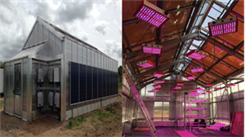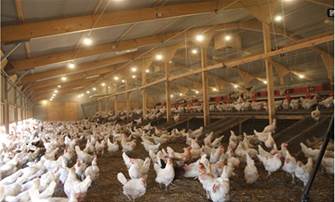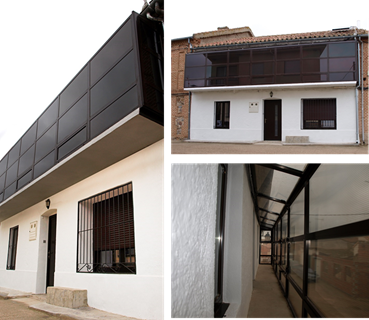Our research
Mitigating the impacts of, and adapting to climate change, reducing energy use in the built environment and enhancing comfort, productivity and the well-being of building users.
Research areas
Our group is committed to addressing the key challenges in our field of expertise.
Each area is sub-divided into further themes. Contact our lead in each area for further information, collaborations or studentships.
Sustainable Building Design
Sustainable Energy Technologies
Efficient technology and clean energy are key to protect our climate. Sustainable Energy Technology includes renewable energy sources (e.g., solar energy, wind energy) and technologies designed to improve energy efficiency.
The Group has won major grants from the Innovate UK, Research Councils, EU and leading industrial companies. e.g., GeoGreenPower Ltd, Spirax-Sarco Engineering Plc) for research into a) Renewable-energy driven building services and b) Sustainable Building Services.
Examples of projects include Solar Powered Thermochemical Energy Storage (EPSRC), PCM Thermal Façade for Low Carbon Buildings (EU) and High Temperature PCM/Brayton Cycle (Innovate UK). The widespread application of sustainable technologies can contribute significantly to the UK Government’s target for reducing carbon emissions by 20% by 2050.
Research themes
- Low Carbon Cooling and Heating
- Ventilation and Heat Recovery
- Renewable Energy Systems
- Smart Controlled Systems
Research images

Innovate UK - Innovative energy Saving and Climate Control System for Greenhouses

Innovate UK - WelChic - Welfare Enhanced Living Conditions for healthier chickens

EU-HERB Project - Holistic Energy-efficient Retrofitting of Residential Buildings
 Combined Heat and Power System
Combined Heat and Power System
Sustainable and Urban Living
Urbanisation, climate change and demographical and psychographic changes have created enormous pressures on our complex and interdependent social, economic and technical urban infrastructure systems. The Sustainable Urban Living research theme aims to undertake research that addresses those challenges through holistic citizen-centric solutions that make use of cutting edge technology to promote and implement a re-examination of how we build resilience in our cities, towns and neighbourhoods.
The research is very inter and cross disciplinary in nature and always undertaken in partnership with industry. Great emphasis is given to solutions that help the housing sector to respond to issues such as housing shortage, changes to regulatory and welfare frameworks, low quality living conditions, more demanding user, the difficulties with providing lifetime environmental and energy performances and financial pressures.
Research themes
- Community Energy
- Sustainable and Energy Efficient Living
- Sustainable and Resilient Planning
Projects
Community Energy
- Project SCENe – Sustainable Community Energy Networks
- SENSIBLE - Storage ENabled SustaInable energy for BuiLdings and communitiEs
- SCENIC – Smart Controlled Energy Networks Integrated in Communities
Sustainable and Energy Efficient Living
- University of Nottingham Smart Campus Initiative
- EU-HERB Project - Holistic Energy-efficient Retrofitting of Residential Buildings
- EnviroUp External Wall Insulation
- EPSRC ISF SustResilCities - Optimising Home Energy and Environmental Monitoring to Support Independent Living
- SCiNET - Greening the Box: retrofit of hard to treat housing
- In-Use and Post Occupancy Evaluation – The Green Street
- PASSIVE-ON
- PHDC – Passive and Hybrid Downdraught Cooling
- CALEBRE - Consumer Appealing Low Energy Technologies for Building Retrofitting
- Solar Decathlon Europe 2010
Sustainable and Resilient Planning
- EU TURaS: Transitioning towards Urban Resilience and Sustainability
- SOUL - Sustainable Optimised Urban Living
- Re-inhabiting the City: the Provision of Sustainable and Resilient Social Housing in City Centres of Emergent Economies in a Changing Climate- the Case of Sao Paulo
- Energy Efficiency and Marketability of Buildings
- Coupling of Building Energy Simulation and CFD
- Wind-driven and Natural Ventilation Potential of Traditional Buildings
Smart and Innovative Materials
Smart and Innovative Materials (SIMs) are engineered materials that can sense a stimulus from an environment and react to it in a useful, reliable, reproducible and usually reversible manner.
Some of the current research areas include the development of phase change materials (PCMs) that are capable of storing and releasing energy at single/multiple phase transitional temperatures for both short and long term energy storage applications in the building sector.
These materials can also be utilised in other industrial and energy consuming sectors. In general research in SIMs supports minimisation of energy consumption and greenhouse gas emissions levels to the benefit of the society as a whole.
Research themes
- Sustainable and Energy Storage Materials
- Innovative Insulation Materials
- Desiccant and Porous Materials
Research images
Smart Multiphase Change Materials (MCMs)

Related Research
Interdisciplinary Research Centre
Projects